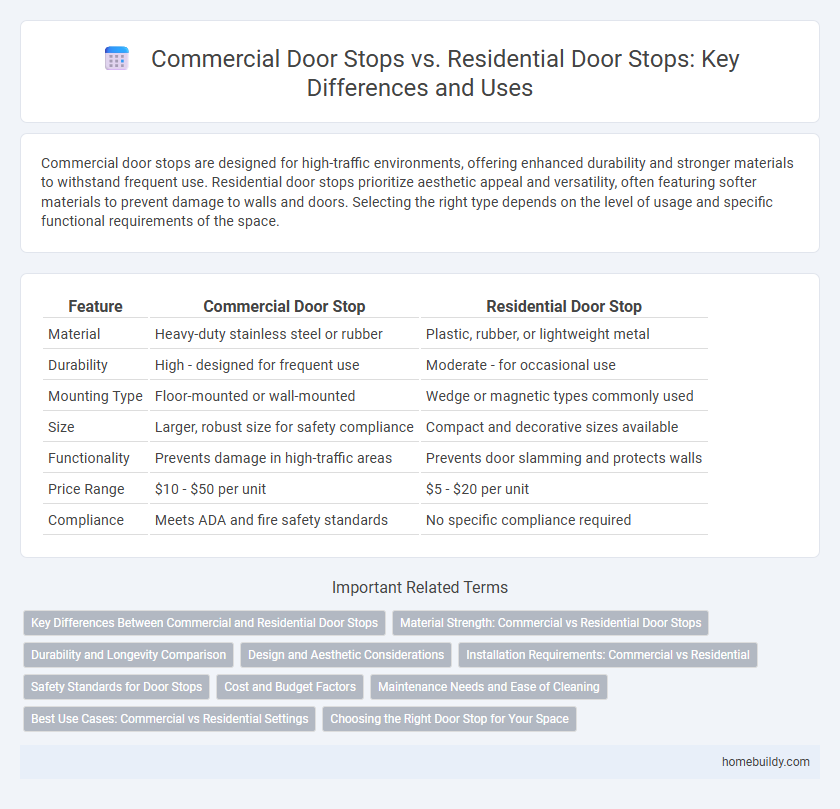Commercial door stops are designed for high-traffic environments, offering enhanced durability and stronger materials to withstand frequent use. Residential door stops prioritize aesthetic appeal and versatility, often featuring softer materials to prevent damage to walls and doors. Selecting the right type depends on the level of usage and specific functional requirements of the space.
Table of Comparison
| Feature | Commercial Door Stop | Residential Door Stop |
|---|---|---|
| Material | Heavy-duty stainless steel or rubber | Plastic, rubber, or lightweight metal |
| Durability | High - designed for frequent use | Moderate - for occasional use |
| Mounting Type | Floor-mounted or wall-mounted | Wedge or magnetic types commonly used |
| Size | Larger, robust size for safety compliance | Compact and decorative sizes available |
| Functionality | Prevents damage in high-traffic areas | Prevents door slamming and protects walls |
| Price Range | $10 - $50 per unit | $5 - $20 per unit |
| Compliance | Meets ADA and fire safety standards | No specific compliance required |
Key Differences Between Commercial and Residential Door Stops
Commercial door stops are designed for heavy-duty use, often made from durable metals like stainless steel or brass to withstand frequent traffic and higher impact forces. Residential door stops prioritize aesthetic appeal and easier installation, typically crafted from materials like rubber, plastic, or wood to protect walls and doors in lower-traffic environments. The key differences lie in durability, material strength, mounting methods, and overall design tailored to the specific frequency and type of usage in commercial versus residential settings.
Material Strength: Commercial vs Residential Door Stops
Commercial door stops are typically made from heavy-duty materials such as stainless steel, solid brass, or reinforced rubber to withstand frequent use and higher impact forces in busy environments. Residential door stops often use lighter materials like plastic, basic rubber, or soft metals, designed for less frequent and lower-intensity usage. The superior material strength in commercial door stops ensures durability and longevity under constant pressure, making them more suitable for industrial and public spaces.
Durability and Longevity Comparison
Commercial door stops are engineered with heavy-duty materials such as stainless steel or solid brass, offering superior durability to withstand frequent use in high-traffic areas. Residential door stops typically use lighter materials like rubber or plastic, suitable for gentle, everyday operation but less resistant to wear and tear over time. The longevity of commercial door stops significantly exceeds that of residential models, making them ideal for environments requiring reliable, long-lasting hardware.
Design and Aesthetic Considerations
Commercial door stops prioritize durability and functionality with sleek, minimalist designs to withstand heavy usage in public spaces, often featuring metal finishes like stainless steel or brushed aluminum. Residential door stops emphasize aesthetic integration with home decor, offering a wider variety of materials such as wood, rubber, or decorative metals that complement interior styles. Both types balance protection with design, but commercial options favor robust, low-profile forms while residential choices focus more on visual appeal and customization.
Installation Requirements: Commercial vs Residential
Commercial door stops require heavy-duty installation with reinforced mounting surfaces to withstand frequent use and higher impact forces, often utilizing industrial-grade screws and anchors. Residential door stops typically involve simpler installation methods suitable for softer walls or floors, requiring fewer reinforcements and lighter hardware. Proper installation in commercial settings ensures durability and safety compliance, while residential installations prioritize ease and minimal wall damage.
Safety Standards for Door Stops
Commercial door stops are designed to comply with stringent safety standards such as ANSI/BHMA and ADA guidelines, ensuring durability and preventing injury in high-traffic environments. Residential door stops prioritize child safety and household durability, often meeting ASTM standards to minimize sharp edges and choking hazards. Both types emphasize secure installation to prevent door damage and accidental pinching, tailored to their specific usage contexts.
Cost and Budget Factors
Commercial door stops typically feature heavy-duty materials like stainless steel or brass, designed to withstand frequent use and harsh environments, resulting in a higher upfront cost compared to residential door stops. Residential door stops are often made from lighter materials such as rubber or plastic, offering a budget-friendly option for less demanding applications with lower durability requirements. Budget considerations for commercial settings must account for long-term durability and maintenance savings, while residential choices prioritize initial purchase price and aesthetic compatibility.
Maintenance Needs and Ease of Cleaning
Commercial door stops typically require more durable materials like stainless steel or heavy-duty rubber to withstand frequent use and are designed for easy maintenance with wipe-clean surfaces that resist dirt and grime buildup. Residential door stops often prioritize aesthetic appeal with softer materials such as wood or fabric, which may require more delicate cleaning methods and occasional replacement due to wear. The ease of cleaning commercial door stops translates to lower maintenance costs and longer lifespan, while residential door stops may need more attentive care to maintain their appearance and functionality.
Best Use Cases: Commercial vs Residential Settings
Commercial door stops are designed for high-traffic environments, providing durability and resistance to heavy usage in offices, hotels, and public buildings. Residential door stops prioritize aesthetic appeal and quieter operation, suited for living spaces and bedrooms where minimal noise and design integration are important. Choosing the right door stop depends on specific needs, such as heavy-duty functionality for commercial spaces versus decorative and noise-reducing features for homes.
Choosing the Right Door Stop for Your Space
Choosing the right door stop depends on the specific needs of your space, with commercial door stops designed for high-traffic durability and residential door stops emphasizing aesthetic appeal and quieter operation. Commercial door stops often feature heavy-duty materials like stainless steel or rubber to withstand constant use, while residential options prioritize versatility in design and ease of installation. Selecting a door stop tailored to the environment ensures optimal protection for walls and doors, while enhancing functionality and style.
Commercial Door Stop vs Residential Door Stop Infographic

 homebuildy.com
homebuildy.com